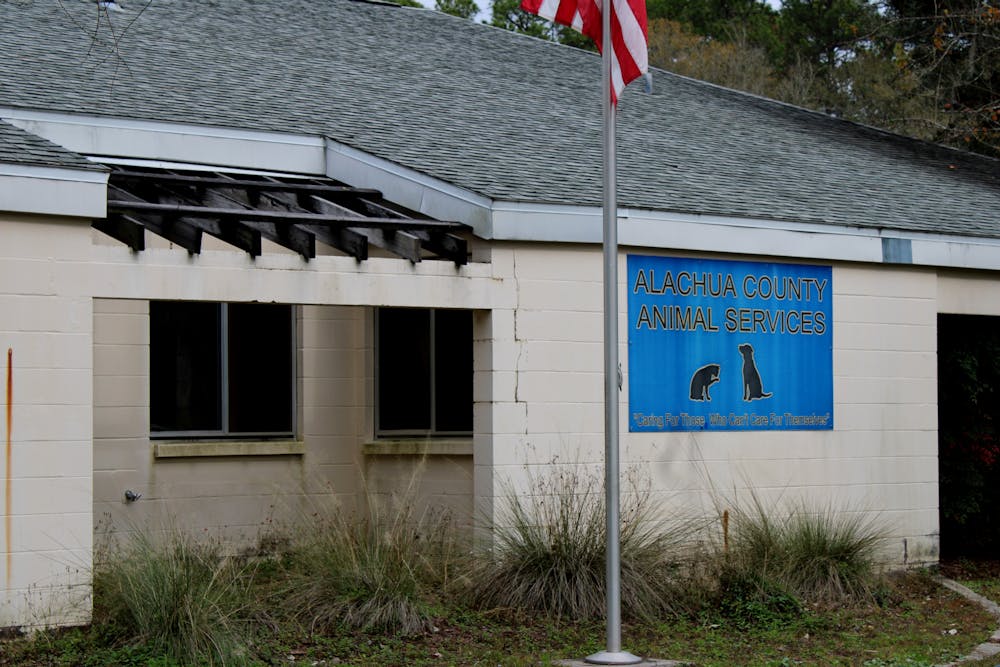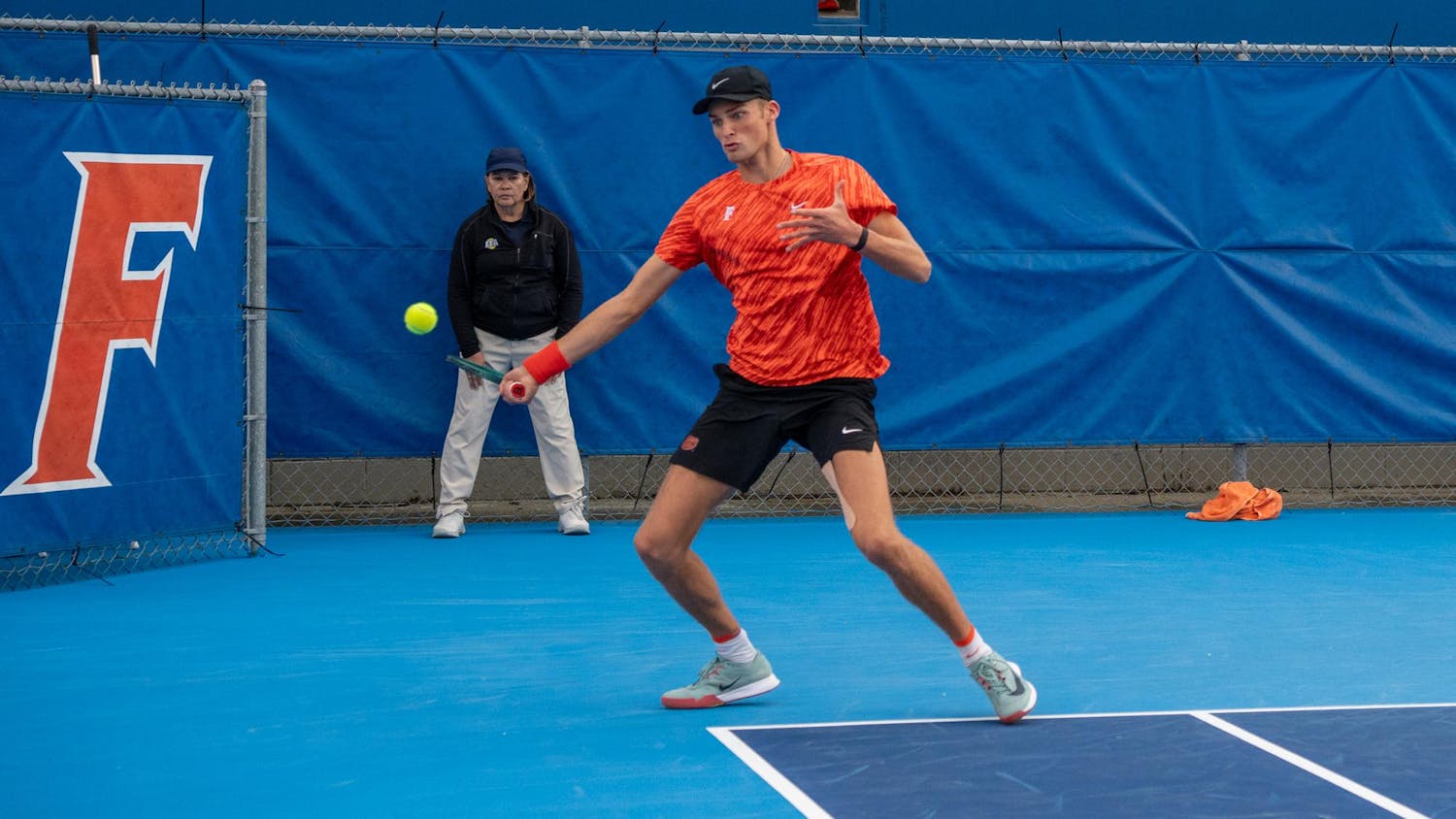As Animal Resources and Care — formerly known as Alachua County Animal Services — becomes increasingly overpopulated and understaffed, more animals are going into the no-kill shelter than coming out, volunteers said.
Alachua County Animal Resources and Care euthanized 168 animals in 2021, and they could have euthanized 149 more last year and still held their “no-kill” title.
The goal of no-kill shelters is to only euthanize animals who are extremely unhealthy, according to Maddie’s Fund — a nationwide no-kill advocate organization. But that isn’t always the reality.
Shelters are still allowed to euthanize up to 10% of the animals they intake each year. This isn’t a government regulated title but rather an “honor code” that shelters are expected to follow with a 90% live release rate.
Melanie Bracewell, a 44-year-old Gainesville resident, volunteered at ACAS from 2019 to 2020.
“I don't think people understand that no-kill means that you're still euthanizing hundreds of dogs a year at the shelter because of the overpopulation problem,” Bracewell said. “I just wish people knew that.”
The shelter euthanized 87 dogs and 81 cats, according to its 2021 report.
The recent canine distemper virus outbreak puts shelter dogs at greater risk of euthanization because those in quarantine are not eligible for adoption. Five dogs have been infected with distemper, according to a Jan. 25 press release.
Solitary Confinement
The shelter has about 110 kennels all in varying conditions. Some kennels include cots while other dogs sleep on the concrete floor. Three walls of the kennels are concrete, confining dogs to only see those who walk past. When all the kennels are full, staff puts the remaining dogs into wire crates.
Bracewell compares the concrete kennels to jail cells. The dogs’ mental health takes a toll in this stressful environment, she said.
“It's almost like solitary confinement for every dog,” Bracewell said. “It’s just a really scary place for them because they’re constantly in a state of agitation and they don’t really get to interact with the other dogs in a positive way.”
Limited staffing at the shelter means workers leave dogs to sit in their own feces, reducing their odds of going for a walk, Bracewell said. Dogs can become aggressive in this type of confinement — a behavior that leads to euthanization.
Dr. Amy Stone, a clinical assistant professor at the UF Small Animal Hospital, wrote in an email that isolation can cause animals to get stressed and may lead to pacing or chewing.
“We don’t really understand all of the behaviors long term that can stem from this stressful time,” Stone wrote. “Some dogs tolerate this just fine. It is going to be dependent upon the dog and the dog’s experience.”
‘Who can help us save these dogs?’
Bracewell’s first email to County Commissioner Anna Prizzia on May 23 was a call for help. She asked officials to investigate the shelter's conditions. She received no response.
“They don’t even care what the volunteers think at that point,” Bracewell said. “They want the volunteers to help them walk their dogs and clean up and do whatever, but they don't really want the volunteer input of who can help us save these dogs.”
Animal Resources and Care puts little effort into reaching out to the community for support, she said. There are only adoption events when the shelter is full. It doesn’t promote fostering opportunities and has yet to replace many of those who have quit in the past year — both staff and volunteers.
“At that point they just want everyone just to not say anything and just deal with it while this dog that you've fallen in love with months ago is gonna be killed,” Bracewell said.
Bracewell wrote to Prizzia again Jan. 5, asking for regular inspections of the shelter and its leadership. She pointed out that the playgroups — which give the dogs time to interact with each other outside of the kennels — weren’t well executed or maintained.
She again received no response from Prizzia. Her message was forwarded to Ed Williams, the director of Animal Resources and Care Jan. 7. Bracewell found this counterproductive as Williams brushed off her concerns and said playgroups have continued to happen up until the dogs’ quarantine. He also pointed to Bracewell’s absence from the shelter.
“I just felt like he seemed to be more concerned about how the shelter looked to the commissioners,” Bracewell said.
Bracewell hasn’t volunteered since August after she felt the shelter was only looking for labor rather than caring for the animals’ well-being. The shelter wasn’t putting effort into finding these dogs foster care or forever homes, she said.
On Jan. 11, Prizzia requested a review of the shelter’s standard operating procedures and policies by the board.
Prizzia didn’t respond to The Alligator's multiple requests for comment by phone and email in time for publication.
‘Adoptable one day, euthanized the next day’
A current volunteer, who has worked there over five years, requested to be anonymous — fearing Williams would kick her out of the shelter.
Despite Williams’ response to Bracewell’s email, the playgroups have been erratic and disorderly, the volunteer said. Many of the staff who attended the Animal Resources and Care playgroup training in June have since then quit due to various reasons.
“Ed is good at making things sound like progress is happening, but if you dig deeper, you realize it’s all a facade,” she said.
The shelter lacks the proper training on understanding dog behavior, the volunteer said. Not all dogs are guaranteed to be taken out due to limited staff and disorganization.
The shelter has trouble keeping track of which dogs have been walked and which have not because most go unrecorded, she added. Now that dogs are staying at the shelter for months on end without being handled for days, there is a rise in behavior issues.
“There definitely are dogs and cats that are euthanized without letting the public know,” the volunteer said. “There are also dogs that were adoptable one day and then euthanized the next day.”
The volunteer emailed the county commissioners and talked with County Manager Michele Lieberman about her concerns with the shelter and started reaching out more frequently, sending page-long emails in October, November and December. Emails were left with no response, except for one thanking her for her feedback and hardwork.
“Volunteers and kennel staff were talking as early as mid-November that things at ACAS were the worst we’ve seen in years and yet commissioners seem to ignore our pleas for help,” the volunteer said.
Williams encourages volunteers with concerns or questions to speak to the volunteer coordinator, a supervisor or himself.
“Things may look a little more disorganized to a volunteer right now then they would normally look because different areas of the shelter are segregated off, having to separate the population,” Williams said.
The shelter tried to transfer more than 40 dogs to partnering rescue groups but did not get a large response. Only one or two dogs were pulled from that group, Williams said.
“We’re seeing the light at the end of the tunnel,” Williams said. “We just did another round of testing and we’re beginning to get results back. We just want to make super sure that before we reopen [dog adoptions] that we’re completely clear of all the distemper and any other respiratory things we might have from time to time.”
Cutting ties
In 2019, two nationally awarded animal control experts from Hillsborough County Pet Resources, director Scott Trebatoski and managing director of operations David Morton, conducted an evaluation of the Alachua County shelter. They criticized Ed and made it clear that the shelter was under bad management.
“Ed lacks a clear sense of urgency and drive to get things done now,” the two wrote in their final report. “His staff have little to no respect for him because they feel he lacks follow through and does not drive changes and improvements needed in a visible way.”
The Humane Society of North Central Florida cut ties with Alachua County Animal Services in 2020 after their more than 20-year partnership due to multiple issues with dogs coming out of ACAS.
The Humane Society was a place the shelter could transfer animals once ACAS became overcrowded. This was stopped partially because many dogs the Humane Society was pulling from the shelter became sick and endangered other dogs in their program, said Margot DeConna, director of advancement.
The society’s Executive Director Heather Thomas wrote an email to the County Commission requesting an intervention.
“Our coalition has been fighting for years to create a higher standard of care for the animals in our county shelter,” Thomas wrote. “Our cries have been ignored and the most powerful thing we could do was to stop taking in sick and mentally unwell animals from Alachua County Animal Services.”
The county gave no direct response. Today, the two organizations' interactions are minimal, but they still lead to concerns.
Animal Resources and Care’s report in 2021 referenced that 21 animals had been transferred to the Humane Society. However, DeConna said they only received seven.
“We have pulled reports before that have been incorrect,” DeConna said.
The shelter is hoping to open up for dog adoptions the second week of February at the latest.
Despite the public's concern, the Alachua County shelter’s 2021 report claims it killed zero healthy animals. Until an intervention proves otherwise, the shelter’s record remains clean.
Contact Namari at nlock@alligator.org. Follow her on Twitter @namari_l .
Namari Lock is a third-year journalism student and production staff member for The Alligator. She has previously worked as multimedia editor, opinions editor, graphic designer and as a general assignment reporter for the Metro desk. In her last semester at UF, Namari is making her Alligator Sports debut as track and field reporter.






